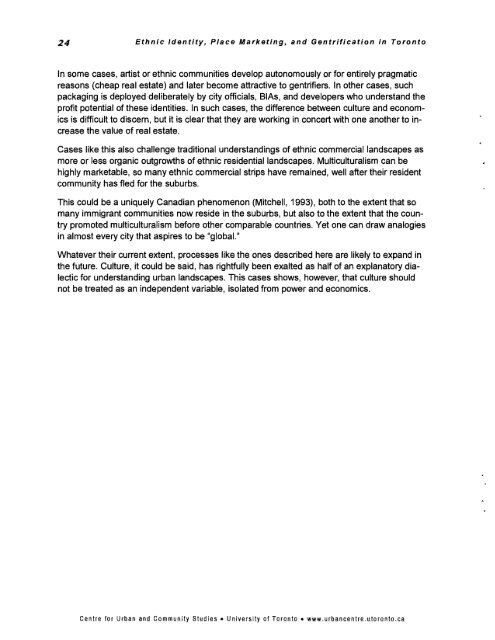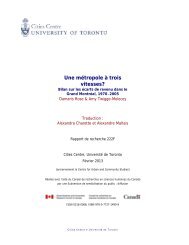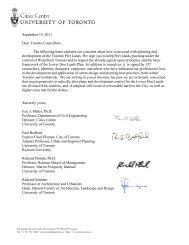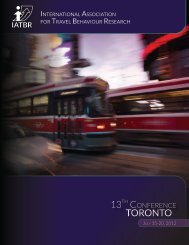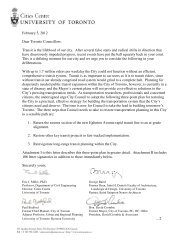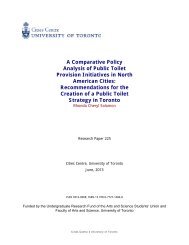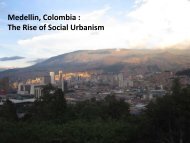24 <strong>Ethnic</strong> <strong>Identity</strong>, <strong>Place</strong> <strong>Market<strong>in</strong>g</strong>, <strong>and</strong> <strong>Gentrification</strong> <strong>in</strong> TorontoIn some cases, artist or ethnic communities develop autonomously or for entirely pragmaticreasons (cheap real estate) <strong>and</strong> later become attractive to gentrifiers. In other cases, suchpackag<strong>in</strong>g is deployed deliberately by city officials, BIAs, <strong>and</strong> developers who underst<strong>and</strong> theprofit potential of these identities. In such cases, the difference between culture <strong>and</strong> economicsis difficult to discern, but it is clear that they are work<strong>in</strong>g <strong>in</strong> concert with one another to <strong>in</strong>creasethe value of real estate.Cases like this also challenge traditional underst<strong>and</strong><strong>in</strong>gs of ethnic commercial l<strong>and</strong>scapes asmore or less organic outgrowths of ethnic residential l<strong>and</strong>scapes. Multiculturalism can behighly marketable, so many ethnic commercial strips have rema<strong>in</strong>ed, well after their residentcommunity has fled for the suburbs.This could be a uniquely Canadian phenomenon (Mitchell, 1993), both to the extent that somany immigrant communities now reside <strong>in</strong> the suburbs, but also to the extent that the countrypromoted multiculturalism before other comparable countries. Yet one can draw analogies<strong>in</strong> almost every city that aspires to be "globaL"Whatever their current extent, processes like the ones described here are likely to exp<strong>and</strong> <strong>in</strong>the future. Culture, it could be said, has rightfully been exalted as half of an explanatory dialecticfor underst<strong>and</strong><strong>in</strong>g urban l<strong>and</strong>scapes. This cases shows, however, that culture shouldnot be treated as an <strong>in</strong>dependent variable, isolated from power <strong>and</strong> economics.<strong>Centre</strong> for Urban <strong>and</strong> Community Studies. University of Toronto. www.urbancentre.utoronto.ca
ReferencesAnderson, K. 1987. The idea of Ch<strong>in</strong>atown: the power of place <strong>and</strong> <strong>in</strong>stitutional practice <strong>in</strong> the mak<strong>in</strong>gof a racial category. Annals of the Association of American Geographers 77(4), pp. 580-598.Badcock, B. 1995. Build<strong>in</strong>g on the foundations of gentrification: Inner-city hous<strong>in</strong>g development <strong>in</strong>Australia <strong>in</strong> the 1990s. Urban Geography 16(1), pp. 70-90.Badcock, B. 1989. Smith's rent gap hypothesis: An Australian view. Annals of the Association ofAmerican Geographers 79, pp. 125-45.Barnes, T. 2003. The 90s Show: Culture leaves the farm <strong>and</strong> hits the streets. Urban Geography 24(6),pp. 479-492.Bourne, L. 1993a. The demise of gentrification? A commentary <strong>and</strong> prospective view. Urban Geography14, pp. 95-107.Bourne, L. 1993b. The myth <strong>and</strong> reality of gentrification: A commentary on emerg<strong>in</strong>g urban forms. UrbanStudies 30, pp. 183-189.Bourassa, S.C. 1993. The rent gap debunked. Urban Studies 30(10), pp. 1731-1744.Buzzelli, M. 2001. From Little Brita<strong>in</strong> to Little Italy: An urban ethnic l<strong>and</strong>scape study <strong>in</strong> Toronto. Journalof Historical Geography. 27(4), pp. 573-587.Carey, E. 2003. Import<strong>in</strong>g diversity across the GTA. Toronto Star. January 25; p. B4Caulfield, J. 1994. City form <strong>and</strong> everyday life: Toronto's gentrification <strong>and</strong> critical social practice. Toronto:University of Toronto Press.Clark, E. 1995. The rent gap re-exam<strong>in</strong>ed. Urban Studies 32(9), pp. 1489-1503.Corso Italia BIA, 2004a. Corso Italia BIA website, .accessed August 30th, 2004.Corso Italia BIA, 2004b. Personal communication from BIA officials, Toronto, June 16, 2004.Deutsche, R. 1996. Evictions: Art <strong>and</strong> spatial politics. Cambridge, MA: MIT Press.Deutsche, R. <strong>and</strong> C.G. Ryan, 1984. The f<strong>in</strong>e art of gentrification. October 31, pp. 91-111.Dunkelman, D. 1999. Your guide to Toronto neighbourhoods. Toronto: Maple Tree.Enterprise Toronto n.d. Toronto Economic Development Office: Bus<strong>in</strong>ess Improvement Area Program,. accessed February 16th, 2004. (Includes map of all TorontoBIAs)<strong>Centre</strong> for Urban <strong>and</strong> Community Studies. University of Toronto. www.urbancentre.utoronto.ca
- Page 1 and 2: Centre forUrban andCommunity Studie
- Page 3 and 4: AuthorsJason Hackworth is Assistant
- Page 5 and 6: Table of Contents1. INTRODUCTION ..
- Page 7 and 8: 1. IntroductionIt has been more tha
- Page 9 and 10: Ethnic Identity, Place Marketing, a
- Page 11 and 12: 3. MethodThis study relies on an ex
- Page 13 and 14: 4. Four Case StudiesLittle Ita IyLi
- Page 15 and 16: Ethnic Identity, Place Marketing, a
- Page 17 and 18: Ethnic Identity, Place Marketing, a
- Page 19 and 20: Ethnic Identity, Place Marketing, a
- Page 21 and 22: Ethnic Identity, Place Marketings a
- Page 23 and 24: Ethnic Identity, Place Marketing, a
- Page 25 and 26: Ethnic Identity, Place Marketing, a
- Page 27 and 28: Ethnic Identity, Place Marketing, a
- Page 29: 5. Culture, Power, and EconomicsThe
- Page 33: Ethnic Identity, Place Marketing, a


